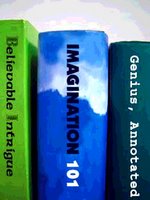Superb Reading, "Great" Books, and a Master Book List
It always baffles me when people allow the bestseller lists to dictate their reading material—a sort of bondage to the tyranny of the vacuous chic. Why feel compelled to read “what’s new” when most of the world’s classics have, in all likelihood, already been written? To read widely—and wisely—is a revolutionary act these days. It's not easy, but the rewards are proportionate.
As Ravi Zacharias writes:
Good reading is like looking for something you have lost and finding it, but in the search finding something else that also had been lost. - Recapture the WonderFor awhile now, I've wanted to start building a book list comprised of titles which I've personally read and thoroughly loved—books which could show up on the NY Times list...but probably won't. Especially if they were published a few decades ago.
To this end I'm about to launch a Master Book List* which will be updated on a continuing basis. I'll probably add a sidebar link for ease of access. But I could use some help on one issue; as with any exclusive club, I'll have to have entry requirements, and my initial book-cred is as follows:
- The book is not widely read, but, due to its overall quality, should be.
- The book makes higher demands on the reader than usual, via concepts or language, with proportionate rewards.
By default, I've got to have some kind of justification for the books I toss out the back door, and my current book cred dispenses with many. However, I'm not convinced it does justice to the volumes I include. Just saying, "They're classic" isn't enough; though there's a subjective element inherent to all book lists, one must outline it more precisely. Your thoughts?
Whatever is concluded about the parameters of great literature, one truth, thankfully, remains unchallenged: We should all be a little more bookish.
*This list previously existed in partial form on another blog, Books Not Everyone Is Smart Enough To Read. I've had some fun there, but busyness dictates that that site be quietly put down, and not resuscitated.











5 comments:
Quoting Ravi proves to be edifying; quite simply, I love books that cause me to wonder.
I look forward to your list.
Sherry has a point, a great novel for instance tells infinitely more than life experience may whisper. This is because a novel is experience distilled.
For instance, read "A Moveable Feast" by Hemmingway and you will see. It is a collection of short stories and ranks up there with Salinger's "Franny and Zooey," as great under-read literature.
They connect with both mind and heart and there is truth because it connects with both (incidentally, that is what I mean by denying the dicotomy).
Simply put, Great literature expresses humanity well.
A great book is one that is alive in some since. It has the ability to draw you into the reality of its world, care about the people that inhabit it, and in a way, draws you to live vicariously through at least one character, learning as he learns, discovering truth through his eyes. At the same time, however, a great book allows you to separate yourself from the proceedings and interact with it as an outisde observer as well. Does this sound confusing?
I guess what I'm trying to say is that a wonderful book invites you in, yet respects you as an outside observer that has the right to draw conclusions and fill in the blanks where necessary. You are actively inside and actively outside the story (I'm talking about fiction, of course).
Long-windedly,
LEV
Wonder-full. Memorable. Human-truth-distilling. "Live" and absorbing.
Some refreshingly eclectic guidelines are emerging here. I'm going to try and incorporate these into a stereo-type busting book-cred...if I can find a way to do it.
Good thoughts! And I know there are more out there...
Sherry's extended take on this topic is worth scanning. She maintains an estimable book list herself.
Post a Comment